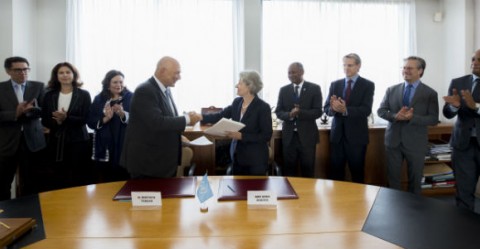
Imagining Africa’s Futures
infocus_iaf.jpg

The African Union's Agenda 2063 and the United Nations 2030 Agenda for Sustainable Development set up our common goals and vision for Africa. In order to advance towards achieving these objectives, Africans must go beyond extrapolating past trends and looking into paths taken by other regions of the world. In this context, UNESCO and the OCP Foundation signed an agreement, in October 2017, to implement an innovative project untitled “Imagining Africa’s Futures (IAF)”.
The objective of IAF is to coordinate a reflection on the future of Africa and to strengthen the continent's foresight capacity. In particular, the new discipline of Futures Literacy (FL) serves as a tool to significantly enhance the capacity to conceive and to use the future. While becoming “futures literate”, people start understanding how they refer to different kinds of futures in the present world as different forms of anticipation. They also acquire the capability to “use these futures” to deploy tools and methodologies to work on particular challenges. “Collective Intelligence Knowledge Creation” is a very powerful instrument for FL, especially through the so-called Futures Literacy Laboratories (FLL). These are methodically designed learning-by-doing workshops, during which participants are able to collectively test a wide range of hypotheses and invent new solutions to improve their world.
IAF’s implementation strategy focuses on three types of actions:
1- The creation of two FL Centers in Africa, one hosted at Mohammed VI Polytechnic University in Morocco and one in sub-Saharan Africa. These Centers will develop research and training programmes in FL, engage different types of communities and serve as regional hubs for FL practitioners in Africa and beyond.
2- The organization of FLL in different regions in Africa. These will contribute to the establishment of a set of communities of good practices for further development of FL throughout Africa.
3- As one output of the above described actions, the production of new visions to illuminate specific local, national or regional challenges in Africa. Topics may include agriculture, rural and urban challenges, biodiversity, fragility and resilience, youth, gender equity, science, technology & innovation (STI), tertiary education and technical & vocational training, intercultural dialogue, access to information through Internet & mobile revolution, and many more.
IAF is a UNESCO intersectoral project carried out by the Africa Department - Sector for Priority Africa and External Relations (Contextual Analysis and Foresight Unit) and the Social and Human Sciences Sector (Management of Social Transformations Programme).



